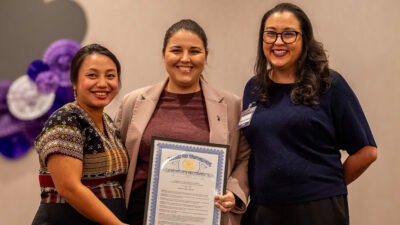Parents play a critical role in how children learn and grow. How you show up in your child’s education can shape their academic journey and how they see themselves in the world.
That’s why it’s important to understand the difference between parental involvement and parental engagement. Both matter, but they do not always look the same or have the same impact. Supporting a child’s learning is not just about showing up; it’s about connecting, partnering and fostering growth.
Here are tips on shifting from involvement to engagement, and why it matters.
What’s the difference between parental involvement and parental engagement?
Parental involvement usually means being present and participating in school-led activities. It can look like attending parent-teacher conferences, showing up to the school play or reviewing your child’s report card each quarter. For example, you might cheer your child on at their science fair and help clean up afterward, or make sure they’ve completed their homework every evening. These are visible signs of support and important moments that show your child you value their education.
Parental engagement is about building relationships and creating a partnership in learning. It means taking an active role in understanding how your child is doing both academically and emotionally and working with their teachers and school community to support them. Instead of simply attending the science fair, you might ask your child what they loved most about the experience, talk through what sparked their curiosity and connect it to a project you can explore together at home. You might also check in with their teacher to find ways to build on that interest throughout the year.
The big difference? Involvement is often about participation. Engagement is about connection.
Why parental engagement matters
While involvement plays an important role, research shows that engaged parenting creates a deeper and more lasting impact. According to the National PTA, children with engaged parents are more than twice as likely to reach higher levels of academic performance compared to their peers whose parents aren’t as actively involved. A report from the Southwest Educational Development Laboratory also found that regardless of income or background, students with engaged families are more likely to graduate and pursue higher education.
Even basic parental involvement supports improved classroom behavior and attendance, according to the Centers for Disease Control and Prevention. But family engagement in schools builds something even stronger: resilience, curiosity, confidence and a love of learning that can last a lifetime.
Simply put, the benefits of parent engagement go far beyond homework help, they empower children to thrive.
Tips for shifting from involvement to engagement
Parents today juggle work, home responsibilities and countless other demands. Building engagement does not have to be overwhelming. Here are a few simple strategies:
-
- Ask open-ended questions: Instead of “Did you have fun at school?” ask “What was the best part of your day?” This sparks real conversation.
- Connect learning to life: If your child is interested in a science topic at school, find a simple home experiment to try together. Ways parents can support learning at home are often fun and easy!
- Collaborate with teachers: Regular parent-teacher communication helps you extend classroom lessons at home.
- Celebrate small successes: Praise effort, creativity and persistence, not just grades or achievements.
- Be present: Sometimes, just sitting together and listening can be one of the most powerful ways to show you care.
Small shifts like these can make engagement feel natural and meaningful without adding extra pressure to busy days.
There’s no one-size-fits-all approach to parenting. Your child’s needs, family dynamic and available time all shape how you show up. Some children benefit from more structured support, while others thrive when given independence. What matters most is that your child knows you’re in their corner, not just when they’re performing, but as they’re growing.
When we see parents not just as caregivers, but as partners, co-educators and advocates, we create a better future for all children. Whether you’re volunteering in the classroom or asking thoughtful questions at the dinner table, how you show up today can shape what’s possible for your child tomorrow.







Comments